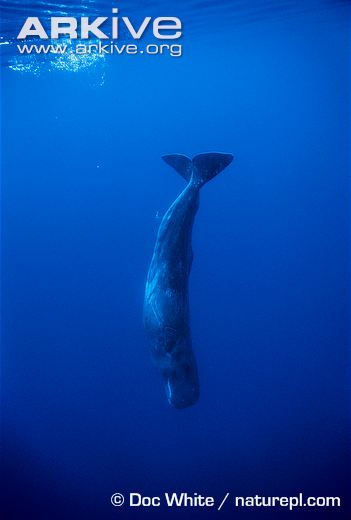Nutrition
 Physeter macrocephalus
is a mammal and is
unable to produce its own food by photosynthetic means. Instead, the sperm whale has become a very
efficient hunter and is highly dependent on prey type foods like
the cephalopod. Being a meat eater allows the sperm whale as
well as many other carnivores to be able to digest more
efficiently than herbivores. In fact, a carnivore can digest
food 80-95% more efficiently than a herbivore due to a shorter
and less complex gut. In order for the massive sperm whale to
obtain its food it requires a lot of energy that will be lost. But,
in return there is a reward of high quality, energy filled food.
Physeter macrocephalus
is a mammal and is
unable to produce its own food by photosynthetic means. Instead, the sperm whale has become a very
efficient hunter and is highly dependent on prey type foods like
the cephalopod. Being a meat eater allows the sperm whale as
well as many other carnivores to be able to digest more
efficiently than herbivores. In fact, a carnivore can digest
food 80-95% more efficiently than a herbivore due to a shorter
and less complex gut. In order for the massive sperm whale to
obtain its food it requires a lot of energy that will be lost. But,
in return there is a reward of high quality, energy filled food.
In the Southern Oceans alone, it has been estimated that
approximately 34 million tons of cephalopods are consumed by
vertebrate predators. About 12 million of that is consumed by
sperm whales alone (Evans and Hindell, 2004). For sperm whales to dive and find their prey
(cephalopods) in the darkness of the ocean they use their
biosonar clicks to be able locate and track them. After
observing sperm whale’s bodies after deep dives, it is believed
that the giant squid that the sperm whales are hunting will
fight back leaving massive scars on the top of the sperm whale’s
head (Evans & Hindell,
2004). Although the sperm whale may use up large
quantities of energy, in return the giant squids (cephalopods)
give off large amount of energy for the sperm whale to obtain.
"Head" back to the homepage, or continue on and learn about reproduction and life history of Physeter macrocephalus.